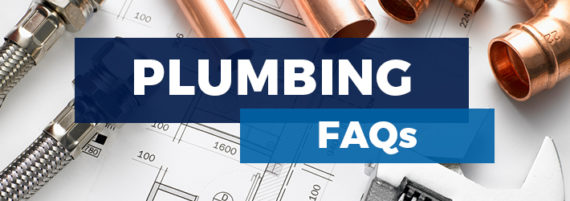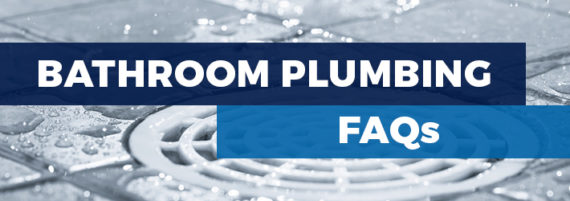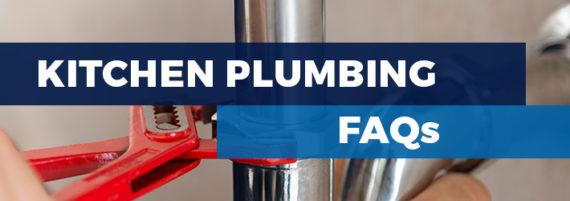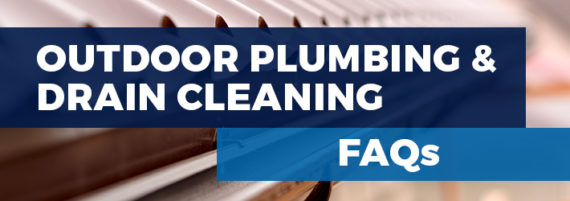Plumbing FAQs


Bathroom Plumbing FAQs
No one wants to see their bathroom plumbing go down the drain, but it happens. Simple problems, such as a clogged or running toilet, are easy to fix, while larger problems, like a backed-up toilet, are tasks you’ll want to leave to the professionals.
- How Do I Unclog a Toilet?
- How Do I Choose a Toilet?
- What Kind of Low-Flow Toilets Do You Recommend?
- Why Is My Toilet Always Running?
- How Do I Replace My Toilet Flange?
- How Do I Test If My Toilet Is Leaking?
- My Water Bill Went up, How Do I Check for Leaks?
- What Do I Do If My Toilet Leaks at the Base?
- How Do I Fix a Small Leak on the Toilet Water Supply Valve?
- Is There Any Way to Repair a Cracked Toilet Tank?
- Why Does My Toilet Smell Every Time I Flush It?
- Why Is Sewage Coming out of the Toilet?
- How Do I Remove White Buildup on Faucet Aerators?
- What Is Causing My Faucet to Leak?
- Why Does the Faucet Run Water When the Shower is On?
- What Causes Residue and Stains in the Bathtub?
- Why is My Shower Pressure Low?
- How Do I Repair a Leaking Shower Head Hose Attachment?
- Do I Actually Need Maintenance on My Bathroom Plumbing?
- How Often Do I Need Maintenance on My Bathroom Plumbing?

Kitchen Plumbing FAQs
People often forget about their kitchen’s plumbing, which tends to include their sink and dishwasher. Your kitchen’s plumbing, however, can quickly become noticeable when your drain or garbage disposal is clogged, or if your dishwasher becomes filthy.
- How Do I Fix a Clogged Garbage Disposal?
- Can I Use Drain Cleaner in a Sink With a Garbage Disposal?
- How Do I Get Rid of Odor Coming From the Garbage Disposal?
- How Can I Clear My Clogged Drain Without Chemicals?
- How Can I Prevent Clogged Drains in My Home?
- How Do Grease Traps and Interceptors Work?
- Why Do We Have Rusty Water Backup in Kitchen Sink?
- Why Is My Kitchen Drain Taking Longer to Drain?
- Why Do the Drainpipes Under My Kitchen Sink Come Loose?
- Do Economy Settings on Our Appliances Save Us Money?
- How Do I Clean a Dishwasher?
- Why Is My Dishwasher Not Draining?
- Why Is My Dishwasher Not Filling With Water?
- Do I Actually Need Maintenance on My Kitchen Plumbing?
- How Often Do I Need Maintenance on My Kitchen Plumbing?

Outdoor Plumbing and Drain Cleaning FAQs
Outdoor plumbing is perhaps best known for the infamous water line leaks that every homeowner dreads, or the continued persistence of tree roots to grow into your water pipes. While most outdoor plumbing problems require a skilled plumber, you can do quite a bit of preventative care.
- How Can I Prevent Frozen Pipes?
- How Do I Prevent a Well From Freezing?
- How Do I Detect The Leak Before Digging?
- What Do I Do If My Water Meter Is Leaking?
- Why Did Our Outdoor Faucet Stop Working All the Sudden?
- Why Does My Outside Faucet Keep Running?
- Can You Use Trenchless Technology on a Bellied Line?
- How Does Trenchless Pipe Relining Work?
- How Do Roots Grow Into My Pipes?
- What Do I Do If Roots Are Clogging My Sewer Drains?
- How Can I Control Roots In My Pipes?
- Can Roots Be Trimmed out of My Stormwater Lateral?
- How Do I Remove Tree Roots in My Drain Pipe?
- What Is a Water Jetter?
- Should I Flush Root Killer Down My Toilet or Hire A Pro?
- Will De-Rooting Pipes Work Forever?
- How Do I Unclog a Drain Pipe That Is Outside My House?
- How Do I Unclog My Main Sewer Line?
- What Is a Sewer Line Inspection Camera?
- When Should My Main Water Line Be Replaced?
- Why Do I Need a Plumber to Clear a Clogged Drain?
- What Are Some Simple Ways to Fix a Clogged Drain?
- How Often Should I Have My Septic System Inspected?

Bathroom Plumbing FAQs
No one wants to see their bathroom plumbing go down the drain, but it happens. Simple problems, such as a clogged or running toilet, are easy to fix, while larger problems, like a backed-up toilet, are tasks you’ll want to leave to the professionals.
How Do I Unclog a Toilet?
The easiest way to unclog your toilet is with a plunger, but if you don’t have one on hand, fill the toilet with dish soap or laundry detergent, add a pot of boiling water and then wait a few minutes before flushing. The hot water should break through the clog as the soap washes everything through the siphon and out of the drain.
How Do I Choose a Toilet?
Look online for comparisons on flush ratings, as well as available rebates on high–efficiency models. Consider features such as pressure assists and heightened thrones when choosing a toilet.
What Kind of Low-Flow Toilets Do You Recommend?
Any low–flow toilet that uses 1.28 gallons per flush (GPF), has a MaP score of 1,000 and a 16.5-inch bowl height is recommended. Look for a WaterSense–certification on the label as well. Find a low–flow toilet that’s efficient and saves on water, yet has the power to wash away waste.
Why Is My Toilet Always Running?
A running toilet is usually caused by a flapper, the rubber or plastic valve on the bottom of your tank, that fails to seal. Open the toilet tank and adjust the float arm to see if the water stops an inch below the overflow pipe. If the water doesn’t continue to fill, the flapper needs replaced.
How Do I Replace My Toilet Flange?
Replace your toilet flange by disconnecting your toilet’s water supply. Flush out all remaining water and unscrew the floor nuts. Remove the toilet from its place on the floor and set it aside on newspaper. Clear away any gunk from the existing flange seal, then unscrew it from the floor to clean underneath it. Screw the new flange into place and reinstall your toilet.
How Do I Test If My Toilet Is Leaking?
Open the toilet tank and put a few drops of food coloring into the water to check if your toilet is leaking. Return after 15 minutes to see if the color inside the toilet bowl has changed. If the color has changed, your toilet has a leak, but if the water’s still clear, you do not have a leak.
My Water Bill Went up, How Do I Check for Leaks?
The main causes of high water bills are running toilets, which can waste up to 200 gallons per day, and leaky faucets, which can drip up to 20 gallons per day. Check for leaks by inspecting faucets, as well as removing your toilet bowl’s tank and listening for any sounds, like hissing. If you don’t find leaks in either of those locations, you’ll need to check your water line and hose bibs. You may also want to contact a plumber.
What Do I Do If My Toilet Leaks at the Base?
Tighten the t-bolts and replace the wax ring if your toilet leaks at the base.
How Do I Fix a Small Leak on the Toilet Water Supply Valve?
Fix a small leak on your toilet water’s supply valve by tightening the shutoff valve. Place a wrench around the valve’s packing nut and give it a one–eighth clockwise turn to fix the leak.
Is There Any Way to Repair a Cracked Toilet Tank?
Yes — turn off the water supply to the tank and remove the remaining water with a suction device. Allow the tank to dry and then apply epoxy to the crack. Smooth the epoxy out and wait for it to dry to repair your cracked toilet tank.
Why Does My Toilet Smell Every Time I Flush It?
Your toilet may smell when you flush because of a broken airtight seal. Sewer gas is blocked from entering homes by the drain venting system. A U–shape in the pipe holds a designated amount of water after each flush. The water acts as an airtight seal to block sewage gases. If too much negative pressure occurs, however, the water level can lower and break the seal, causing a smell after you flush.
Why Is Sewage Coming out of the Toilet?
If sewage is coming out of your toilet, it’s likely caused by a backup in the main sewage line. Call a plumber right away for assistance.
Hopefully, you’ll never experience sewage escaping from your toilet, but something you’ll likely experience as a homeowner or long-term renter is a leaky faucet or shower head attachment. So, how do you fix both of those problems and more? Find out below:
How Do I Remove White Buildup on Faucet Aerators?
Remove buildup on faucet aerators by taking off the aerator. Soak it in acidic liquid and then rinse and scrub it under running water before reattaching it to the faucet.
What Is Causing My Faucet to Leak?
Leaky faucets are usually caused by worn rubber washers, which give out over time due to valve seat friction. Replace the washers to fix your leak.
Why Does the Faucet Run Water When the Shower is On?
Failure of the diverter to close, which blocks the faucet’s water when the shower is on, can cause the faucet to run water when using your shower. Diverter problems are usually due to calcium or mineral deposits.
What Causes Residue and Stains in the Bathtub?
Low pH and acid water, both of which are caused by high amounts of carbon dioxide in the water supply, can cause rusty, blue or green stains in the bathtub.
Why is My Shower Pressure Low?
If your shower pressure is low when other faucets in the house are running, your household’s water supply is insufficient due to an inadequate plumbing system. If the problem persists when all other faucets are off, it’s likely due to pipe or patch leaks.
How Do I Repair a Leaking Shower Head Hose Attachment?
A faulty gasket or poor connection typically causes a leaking shower head hose attachment. Remove the shower head and soak it for half an hour in white vinegar. Replace the rubber washers and reconnect the shower head to test for any remaining leaks.
Do I Actually Need Maintenance on My Bathroom Plumbing?
Maintenance on your bathroom’s plumbing is necessary whenever a faucet leak persists or drain blockage occurs. A clogged toilet, or toilet that continues to run, as well as low water pressure also mandate service, especially when do-it-yourself (DIY) home repairs fail to fix the problem.
How Often Do I Need Maintenance on My Bathroom Plumbing?
Plumbing maintenance should be performed every 18 months to two years, or whenever an issue arises with your bathroom’s plumbing.

Kitchen Plumbing FAQs
People often forget about their kitchen’s plumbing, which tends to include their sink and dishwasher. Your kitchen’s plumbing, however, can quickly become noticeable when your drain or garbage disposal is clogged, or if your dishwasher becomes filthy.
How Do I Fix a Clogged Garbage Disposal?
Turn off the disposal, insert an appropriately sized hex or Allen wrench into the hole of the disposal motor. Rotate the wrench back and forth to dislodge the obstruction and fix your jammed garbage disposal.
Can I Use Drain Cleaner in a Sink With a Garbage Disposal?
Yes, Drano® and similar brands make sink–cleaning products that are safe for all sinks, including those with garbage disposals. If in doubt, check the drain cleaner’s label before using it.
How Do I Get Rid of Odor Coming From the Garbage Disposal?
Remove odor from your garbage disposal by using items like lemons, ice cubes, baking soda and vinegar.
How Can I Clear My Clogged Drain Without Chemicals?
Clear a clogged drain without chemicals by using baking soda and vinegar. Pour half a box of baking soda and half a cup of vinegar down the drain, then plug the faucet with a plunger for 30 seconds to prevent the mixture from bubbling upward. Let the mixture sit for 30 minutes. Boil a kettle of water and then pour it down the drain to clear it.
How Can I Prevent Clogged Drains in My Home?
Prevent clogged drains in your home by stopping hairs, oils, greases, coffee grinds, pasta or hard produce parts, such as broccoli stalks, carrots or apple cores, from going down the drain. A drain stopper or filter can help stop materials, like coffee grinds, pasta and produce from entering your drain.
How Do Grease Traps and Interceptors Work?
Grease traps and interceptors catch oils, greases and other fatty deposits, so they don’t enter your sanitary sewer system.
Why Do We Have Rusty Water Backup in Kitchen Sink?
A backup of rusty water into your kitchen sink is caused by three potential problems — sediment deposits in the water tank, rusted piping or bacteria in the water from iron oxide.
Why Is My Kitchen Drain Taking Longer to Drain?
If your kitchen drain is taking longer to empty, then a clog is forming, perhaps deep in the drain. A plunger may be able to pull out the obstruction. You could also use a drain cleaner or baking soda and vinegar solution, along with boiling water to loosen and break up the clog.
Why Do the Drainpipes Under My Kitchen Sink Come Loose?
Loose drainpipes under a kitchen sink tend to come unfastened because of a loosened washer, which holds the pipes.
Now that you’re up-to-date on how to fix and clean your garbage disposal and sink, why not learn about how to clean your dishwasher and when to schedule routine maintenance? If your answer’s yes, you’ll find the answers below:
Do Economy Settings on Our Appliances Save Us Money?
Yes and no. You could save on your energy costs, and possibly prolong the life of the appliance if it performs well in conservation mode. If the performance is unsatisfactory, however, the economy settings could lead to higher costs as you might end up doing two cycles per wash rather than one.
How Do I Clean a Dishwasher?
Clean your dishwasher by filling the detergent container with white vinegar and running the machine on a long, hot cycle. Do not leave any dishes in the washer for this cleaning cycle.
Why Is My Dishwasher Not Draining?
If your dishwasher isn’t draining, it’s likely due to a leaky inlet valve or mineral deposits in the pipes. Empty the dishwasher and start a new cycle on empty. Cancel the cycle after a few seconds and open the door. If the water is gone, the dishwasher is fine. If not, the inlet valve should be replaced.
Why Is My Dishwasher Not Filling With Water?
Dishwashers that aren’t filling with water are often caused by a dirty filter on the inlet valve. Clean the filter and try another cycle setting. If the dishwasher still doesn’t fill, replace the inlet valve.
Do I Actually Need Maintenance on My Kitchen Plumbing?
For anyone not comfortable with DIY maintenance — definitely. If DIY methods fail to fix a leaky pipe or faucet, clogged drain or low–pressure faucet, your only option is to call a plumber.
How Often Do I Need Maintenance on My Kitchen Plumbing?
A kitchen plumbing system, regardless of its age, should be scheduled for maintenance once a year.

Outdoor Plumbing and Drain Cleaning FAQs
Outdoor plumbing is perhaps best known for the infamous water line leaks that every homeowner dreads, or the continued persistence of tree roots to grow into your water pipes. While most outdoor plumbing problems require a skilled plumber, you can do quite a bit of preventative care.
How Can I Prevent Frozen Pipes?
Prevent frozen pipes during the coldest times of the year by allowing sink faucets to slightly drip non–stop, especially if you’re away from home for several days.
How Do I Prevent a Well From Freezing?
Prevent your well from freezing by using insulation material, like foam or thick fabric, or a heat lamp or well cover.
How Do I Detect The Leak Before Digging?
Find a leak before digging by using an underground leak detector.
What Do I Do If My Water Meter Is Leaking?
If your water meter is leaking, call a plumber immediately. You should also contact your water utility provider as well because if the leak is between the meter leading to the water utility, it is their financial responsibility to fix the leak. Leaks between the meter and your home are yours.
Why Did Our Outdoor Faucet Stop Working All the Sudden?
Outdoor faucets tend to stop working suddenly due to debris in the faucet’s opening or an obstruction with the aerator or inner spout.
Why Does My Outside Faucet Keep Running?
Your outside faucet is likely running because the gasket or the valve seat has worn out and needs to be replaced.
Can You Use Trenchless Technology on a Bellied Line?
Trenchless technology can’t be used on a bellied line because the line needs to be accessed at the belly and fitted with a new stretch of pipe.
How Does Trenchless Pipe Relining Work?
Trenchless pipe relining works by using a pipe liner, which is a tube that’s blown into a damaged pipe. A pipe liner serves as a quick-fix alternative to pipe replacement.
While many homeowners ensure their pipes remain warm during the frozen months, many are unaware of tree roots that are encroaching upon their sewer pipes. Learn the answers to the most common questions about trees and your outdoor plumbing below:
How Do Roots Grow Into My Pipes?
Roots tend to grow wherever water is present in the soil. Therefore, roots are drawn to sewer pipes, which encourage tree roots to grow into them.
What Do I Do If Roots Are Clogging My Sewer Drains?
Have a plumber run an inspection of the drains to find the roots clogging your sewer drains and eliminate the problem.
How Can I Control Roots In My Pipes?
Control roots in your pipes by calling a plumber to run cutting blades through the pipes. You can also flush a root–growth suppressant down your toilet twice each year to inhibit regrowth.
Can Roots Be Trimmed out of My Stormwater Lateral?
Roots can be trimmed out of any plastic, cast iron or clay tile stormwater lateral pipe, as well as many corrugated iron and thin wall pipes.
How Do I Remove Tree Roots in My Drain Pipe?
Aside from digging up the spot and cutting out the root, you can remove tree roots with a hydro jetter or root–removal chemicals.
What Is a Water Jetter?
A water jetter is a high–powered blast hose that’s inserted into pipes to blow away obstructions, dirt and grime.
Should I Flush Root Killer Down My Toilet or Hire A Pro?
Root killer products are best applied by a professional. If you opt to do it yourself, read the instructions carefully. Use root killer through a sewer drainage port with a flow of water.
Will De-Rooting Pipes Work Forever?
De-rooting pipes won’t work forever because when roots enter a pipe, the holes remain after the roots are cleared. The roots will grow back in and need to be removed again. This cycle gradually puts more and more pressure on the pipes, which will need to be replaced eventually.
If you still have some unanswered questions regarding outdoor plumbing and drain cleaning, don’t worry. We have you covered with the following answers:
How Do I Unclog a Drain Pipe That Is Outside My House?
Unclog a drain pipe outside of your home by cleaning the area around the pipe entrance and inserting an auger cable. Power the auger cable through the pipe until it hits the main sewer, then back it out. Run hose water into the pipe to clear away the broken-up root clog.
How Do I Unclog My Main Sewer Line?
Unclog your main sewer line by locating the clean–out plug in your basement, crawl space, garage or outer–foundation of your house. Insert an auger cable or sewer rod into the clean-out plug and work it through until it clears the obstruction.
What Is a Sewer Line Inspection Camera?
A sewer line inspection camera is a waterproof camera that makes it possible to inspect sewer lines and other underground pipes.
When Should My Main Water Line Be Replaced?
Your main water line should be replaced when it becomes corroded. Pipes in homes built 60 or more years ago should be checked annually for signs of corrosion.
Why Do I Need a Plumber to Clear a Clogged Drain?
Plumbers are helpful for clearing a clogged drain if your DIY methods don’t work or if you don’t feel comfortable unclogging the drain. In any case, DIY methods are best reserved for people with experience.
What Are Some Simple Ways to Fix a Clogged Drain?
Unclog drains with an over-the-counter drain-cleaning formula, or with a mixture of baking soda, vinegar and boiling water. A clog can also be broken up with a drain snake or extracted with a vacuum.
How Often Should I Have My Septic System Inspected?
You should have your septic system inspected every three to five years.
What to Do With a Plumbing Problem
Plumbing problems often have two options — fix it yourself or call a plumber. You may be more than capable of fixing a clogged toilet or preventing frozen pipes over winter, but many plumbing tasks are safer in the hands of experienced plumbers.
The best solution for clogs, leaks, low water pressure and intrusive roots is to call a plumber. DIY solutions may provide temporary relief to certain problems, but a plumbing professional will have the experience and tools to set your plumbing system right.
Reliable Plumbing Service in Chester and Lancaster County
At Summers & Zim’s, Inc., we’ve provided a range of plumbing services for the residents of Chester and Lancaster County for more than four generations and 80 years. To learn more about our services or to have our team assist with your plumbing, click on over to our plumbing services page.
Discover the Summers & Zim’s Difference in Plumbing Services
When you’re faced with a plumbing challenge, turn to Summers & Zim’s – your local authority in plumbing excellence in Chester County, PA. With a rich history of over 95 years, our commitment to delivering top-tier plumbing services is unwavering. We are not just plumbing professionals; we are your neighbors, committed to maintaining the health and safety of your home’s plumbing systems.
Our team of licensed plumbers brings a friendly and approachable demeanor to every job, combined with a depth of expertise certified by industry leaders such as the Master Plumbing License and the Environmental Protection Agency. We’re also proud holders of the North American Technician Excellence certification, a testament to our technical skills and dedication to quality.
At Summers & Zim’s, we understand that plumbing is more than just pipes and fixtures; it’s about creating a harmonious flow within your home. That’s why we offer personalized solutions tailored to your specific needs, whether it’s a simple repair, a full-scale installation, or preventative maintenance. We stand behind our work with a unique 5 Point Guarantee, ensuring your complete satisfaction with every turn of the wrench.
Choose Summers & Zim’s for plumbing services that go beyond the call of duty, where the quality of our work reflects the heart we put into every project. We’re here to ensure that every drop of water in your home counts, providing you with reliable, efficient, and friendly service that keeps your day flowing smoothly.

-
Design Guarantee
At Summers & Zim’s, we’re committed to excellence in every repair and installation we undertake. Our Design Guarantee ensures that the work we do not only meets but exceeds your expectations. Whether it’s a complex HVAC installation or a routine plumbing fix, we promise that it will function exactly as intended. If, for any reason, you feel that the results aren’t what you were expecting, our team is prepared to make necessary adjustments or replacements, completely free of charge. We’re not satisfied until you are, ensuring your home’s systems are both efficient and reliable.
-
No Lemons Guarantee
We understand the frustration of a new plumbing fixture failing to perform as expected. With our No Lemons Guarantee, you have our assurance of quality and reliability. If any plumbing fixture we’ve installed in your home shows signs of malfunction or unreliability, rest assured, we will replace it with a new one at no additional cost. This guarantee is our promise of quality and your peace of mind, ensuring that your plumbing investments are secure and reliable.
-
$500 No Frustration Guarantee
Your satisfaction is our top priority, and we stand firmly behind the quality of our plumbing installations. With our $500 No Frustration Guarantee, we take our commitment to a higher level. If any new plumbing installation we provide doesn’t perform as promised or expected within the first two years, we acknowledge the inconvenience it causes. To make it right, we will compensate you with $500. This guarantee underscores our dedication to providing services that not only meet but exceed your expectations.
-
Home Protection Guarantee
At Summers & Zim’s, we treat your home with the utmost care and respect. Our Home Protection Guarantee ensures that in the unlikely event our team accidentally causes any damage to your home during our service, we will bear the cost of all necessary repairs or replacements. We strive to work meticulously, but should any mishaps occur, you can have peace of mind knowing that we will take full responsibility to restore your home to its original condition, or better.
-
100% Money Back Guarantee
Your trust in our system installations is valued, and we aim to deliver solutions that perfectly match your needs and expectations. Our 100% Money Back Guarantee is a testament to this commitment. If you find that a new system installation by Summers & Zim’s does not fulfill your requirements or live up to your expectations, we will not only remove the installation but also return every penny of your investment. This guarantee is our way of ensuring that your investment in your home’s systems is completely risk-free.


